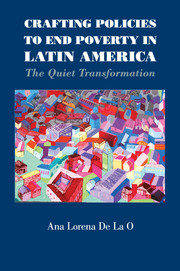Book contents
- Frontmatter
- Dedication
- Contents
- List of Figures
- List of Tables
- Acknowledgments
- 1 Introduction
- 2 The Universe of Cash Transfer Programs
- 3 Politics of Fighting Poverty
- 4 Explaining Policy Adoption and Design
- 5 Explaining Policy Outcomes
- 6 Conditional Cash Transfers and Clientelism
- 7 The Electoral Bonus of Conditional Cash Transfers
- 8 Conclusions
- Appendix
- References
- Index
7 - The Electoral Bonus of Conditional Cash Transfers
Published online by Cambridge University Press: 05 March 2015
- Frontmatter
- Dedication
- Contents
- List of Figures
- List of Tables
- Acknowledgments
- 1 Introduction
- 2 The Universe of Cash Transfer Programs
- 3 Politics of Fighting Poverty
- 4 Explaining Policy Adoption and Design
- 5 Explaining Policy Outcomes
- 6 Conditional Cash Transfers and Clientelism
- 7 The Electoral Bonus of Conditional Cash Transfers
- 8 Conclusions
- Appendix
- References
- Index
Summary
The increasing popularity among Latin American governments of conditional cash transfers raises a fundamental question about the electoral returns of government spending in general, and targeted benefits in particular. When a traditionally clientelistic party shifts away from discretionary spending to programmatic politics, can it retain the support of targeted voters? To date, the burgeoning distributive politics literature has given more attention to how politicians optimize their electoral prospects than to the conditions under which such strategies successfully increase support for incumbents. This focus on discretionary spending leaves out a subset of allocation strategies in which targeting is based on technical criteria, as is the case for many conditional cash transfers, as opposed to electoral criteria.
Although speculations about CCTs' proincumbent effects abound in the media, 3 scholarly work on the subject is inconclusive, as I describe in more detail in this chapter (Cerda and Vergara 2008; Cornelius 2004; Díaz-Cayeros et al. 2007; Díaz-Cayeros and Magaloni 2009; Green 2006; Zucco 2013). The empirical conundrum that has bedeviled previous attempts to uncover the causal effect of targeted government programs is that if incumbents strategically funnel resources to areas where they are electorally vulnerable (or strong), then estimates of electoral returns are biased downward (or upward). If we could observe the process that incumbents use to allocate resources, then accounting for it would be enough. However, in most cases we can only approximate the process with some error. Thus, the concern that remains is that an unobserved omitted variable biases the estimations (Levitt and Snyder 1997). In addition, non-recipients' responses to targeted programs (Humphreys and Weinstein 2009) and social desirability response bias when estimating the effects of CCT with survey data can render inferences invalid.
To overcome these challenges, in this chapter I take advantage of the fact that Progresa's randomized impact evaluation offers exogenous variation in the duration of exposure to program benefits.
- Type
- Chapter
- Information
- Crafting Policies to End Poverty in Latin AmericaThe Quiet Transformation, pp. 134 - 149Publisher: Cambridge University PressPrint publication year: 2015

